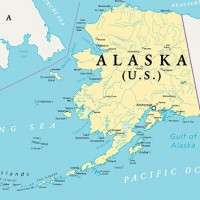
 iStock/Thinkstoc
iStock/Thinkstoc
(NEW YORK) — For four generations, the family of Esau Sinnok has been born, lived, worked and died in Shishmaref, a small Inuit Eskimo village off the western Alaskan coast. But there likely won’t be a fifth generation in the village.
On Thursday, unofficial results showed that the majority in the small community of 600 voted to relocate the village as a result of the effects of climate, which include erosion and rising sea levels.
“You know it really breaks my heart, it hurts my heart, knowing that my one and only home will have to soon relocate, and having all the memories that I have on Shishmaref be gone when Shishmaref is gone, and when the island is underwater,” Esau Sinnok, 18, told ABC News today,
“I woke up every morning with a view of the shoreline and the waves,” Sinnok said. “It is a very friendly, small community, everyone is nice there, everybody knows everybody.”
The unofficial results of the special election held earlier this week showed that 89 were in favor of relocating and 78 chose to stay on the island with increased protections, according to the Shishmaref municipal clerk’s office. A spokesperson for the clerk’s office told ABC News last night that the unofficial count has yet to include absentee and special needs ballots.
Sinnok did not vote because he is in Fairbanks at college. But he said he would have voted to relocate the village.
He said he has witnessed firsthand the devastating effects of climate change in in his hometown. Since he was born in 1997, “we probably lost 100 plus feet of land and we’ve been getting a lot less snow in the winter.”
And, since the 90s, the community had to move about 19 houses from one side of the island to the other because of coastal erosion, he said.
“My grandfather said the ice used to freeze in October when he was growing up and now this past winter we had to wait until late November, December, to safely go out on the ice,” Sinnok said. He said his uncle passed away after he “fell through ice where it was usually thick enough” to walk over.
The family has been directly affected by climate change in other ways, he said. One house that had to be abandoned was the home of Sinnok’s grandmother.
Sinnok said a majority of Shishmaref residents are Iñupiaq Eskimo, a culture that he said dates back 4,000 years.
The Iñupiaq practice subsistence farming and hunting, he said. Although their way of life has not significantly contributed to manmade climate change, they are experiencing firsthand its devastating impact, Sinnok said.
Sinnok said seeing the impacts of global warming inspired him to become an activist and “to try and spread the word of climate change.”
A student at the University of Alaska in Fairbanks, he serves as an Arctic Youth Ambassador for the U.S. Chairmanship of the Arctic Council.
His work was honored by the White House last month when he was received a White House Champions of Change for Climate Equity award. In 2015, Sinnok attended the United Nations climate talks in Paris, France.
“I never take any day for granted when I go” to Shishmaref, Sinnok said.
Shishmaref is in the State of Alaska Immediate Action Workgroup’s list of the six top-priority communities that were imminently threatened by the impacts of climate change.
“Shishmaref is where my heart is, that’s my home. When its all said and done Shishmaref will always be my home. I would love to be buried there when I pass away,” Sinnok said.
Copyright © 2016, ABC Radio. All rights reserved.










